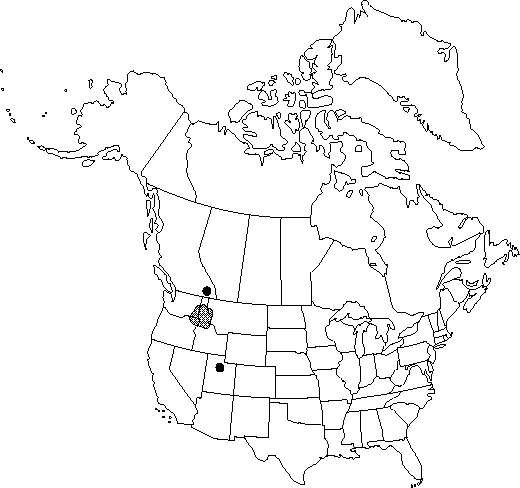Anemone piperi
Bull. Torrey Bot. Club 29: 153. 1902.
Aerial shoots 10-35 cm, from rhizomes, rhizomes primarily vertical, occasionally strongly ascending. Basal leaves (0-) 1-2, ternate; petiole 10-20 cm; terminal leaflet sessile, rhombic, lanceolate, or oblanceolate, (1.5-) 2.5-6 × (1-) 2-4 cm, base narrowly cuneate, margins coarsely serrate to coarsely dentate on distal 1/2-2/3, apex acuminate to narrowly acute, surfaces pilose or glabrous; lateral leaflets unlobed or sometimes 1×-lobed; ultimate lobes 10-19 mm wide. Inflorescences 1-flowered; peduncle coarsely pilose distally; involucral-bracts 3, 1-tiered, ternate, ±similar to basal leaves, bases distinct; terminal leaflet sessile, rhombic, lanceolate, or oblanceolate, (1.5-) 2-5.5 (-7) × (0.6-) 1-2.5 cm, base narrowly cuneate, margins coarsely serrate to coarsely dentate on distal 1/2-2/3, apex acuminate to narrowly acute, surfaces pilose or glabrous; lateral leaflets unlobed or sometimes 1×-lobed; ultimate lobes (5-) 8-18 mm wide. Flowers: sepals 5-7, white, rarely pinkish, elliptic-obovate to ovate, (6-) 8-20 × 6-8 mm, glabrous; stamens 35-55 (-90). Heads of achenes nearly spheric; pedicel (1.5-) 2-5 cm. Achenes: body ellipsoid to obliquely ovoid, 3-4 × 1.5-2 mm, not winged, villous; beak straight or slightly curved, 0.5-1 mm, glabrous or proximally minutely puberulous, not plumose.
Phenology: Flowering spring–summer (Apr–Aug).
Habitat: Shaded, moist woods
Elevation: 400-3000 m
Distribution

B.C., Idaho, Mont., Oreg., Utah, Wash.
Discussion
Plants of Anemone piperi from southeastern Washington and northeastern Oregon (i.e., the westernmost limits of the species) are sometimes intermediate between A. piperi and A. oregana. Although they possess vertical rhizomes characteristic of A. piperi, they have the bluish or pinkish sepals of A. oregana. These plants are best referred to A. piperi, pending detailed biosystematic analysis.
Selected References
None.
Lower Taxa
"villous" is not a number.